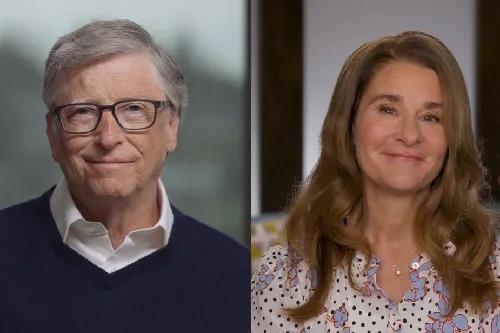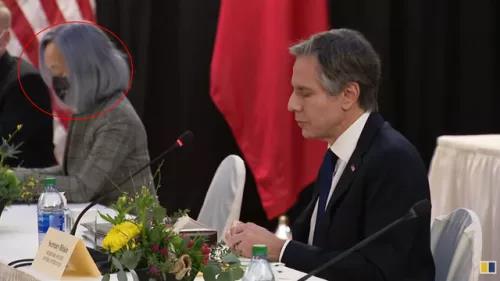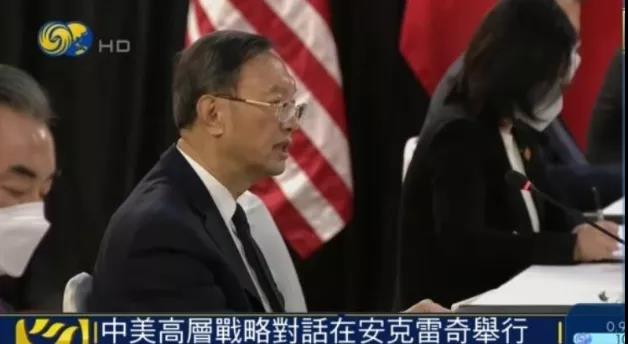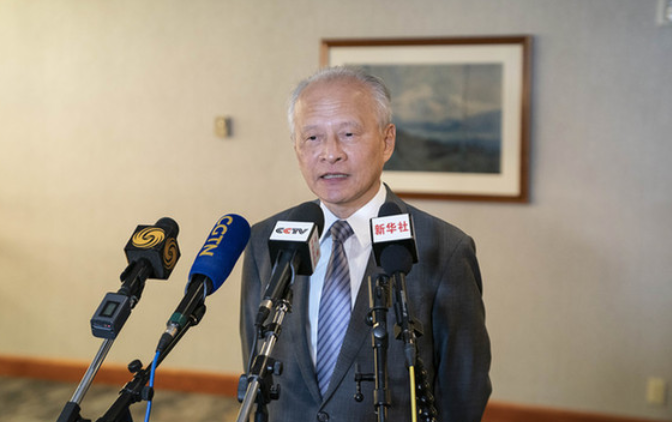
双语对照:盖茨夫妇2021年度公开信
Our 2021 Annual Letter
我们的2021年度公开信
The year global health went local
这一年,全球健康与你我休戚与共
By Bill and Melinda Gates
比尔和梅琳达·盖茨
January 27, 2021
2021年1月27日
We are writing this letter after a year unlike any other in our lifetimes.
写下这封信时,我们刚刚经历了前所未有的一年。
Two decades ago, we created a foundation focused on global health because we wanted to use the returns from Microsoft to improve as many lives as possible. Health is the bedrock of any thriving society. If your health is compromised – or if you’re worried about catching a deadly disease – it’s hard to concentrate on anything else. Staying alive and well becomes your priority to the necessary detriment of everything else.
二十年前,我们创办了盖茨基金会,聚焦全球健康,希望用从微软获得的收益尽可能改善更多人的生活。健康是任何社会繁荣发展的基石。如果你的健康受到威胁,总是担心染上什么可能致命的疾病,那就很难全心投入到任何其他事情中,因为生存和健康会成为你的首要任务。
Over the last year, many of us have experienced that reality ourselves for the first time. Almost every decision now comes with a new calculus: How do you minimize your risk of contracting or spreading COVID-19? There are probably some epidemiologists reading this letter, but for most people, we’re guessing that the past year has forced you to reorient your lives around an entirely new vocabulary – one that includes terms like “social distancing” and “flattening the curve” and the “R0” of a virus. (And for the epidemiologists reading this, we bet no one is more surprised than you that we now live in a world where your colleague Anthony Fauci has graced the cover of InStyle magazine.)
过去一年中,许多人第一次对此有了切身体会。现在,我们做出任何一个决定之前都要考虑一个新的因素:如何将感染或传播新冠肺炎的风险降到最低?
这封信可能会被一些流行病学家读到,但对于大多数人来说,我们猜想大家都在过去一年被迫学习了一套全新的词汇,并努力调整,以适应这样的生活,比如“社交距离”、“拉平曲线”和某种病毒的“R0值”,等等。(对于正在读这封信的各位流行病学家来说,你们恐怕从来不会相信自己的同事安东尼•福奇竟然登上了时尚杂志《InStyle》的封面。)
When we wrote our last Annual Letter, the world was just starting to understand how serious a novel coronavirus pandemic could get. Even though our foundation had been concerned about a pandemic scenario for a long time – especially after the Ebola epidemic in West Africa—we were shocked by how drastically COVID-19 has disrupted economies, jobs, education, and well-being around the world.
撰写去年的年信时,世界才刚刚开始了解新型冠状病毒大流行可能造成的严重影响。尽管我们基金会一直对全球暴发大流行病的可能保持警惕——尤其在西非埃博拉疫情之后——但新冠肺炎疫情对世界各地的经济、就业、教育和社会生活造成的冲击之大还是让我们始料未及。
Only a few weeks after we first heard the word “COVID-19,” we were closing our foundation’s offices and joining billions of people worldwide in adjusting to radically different ways of living. For us, the days became a blur of video meetings, troubling news alerts, and microwaved meals.
在第一次听到“新冠肺炎(COVID-19)”这个词仅仅数周之后,我们就关闭了基金会在各地的办公室,与全球几十亿人一起开始适应完全不同的生活方式。对我们而言,日子变成了一次次视频会议、一条条令人担忧的新闻推送和一顿顿微波快餐组成的混沌时光。
But the adjustments the two of us have made are nothing compared to the impact the pandemic has had on others. COVID-19 has cost lives, sickened millions, and thrust the global economy into a devastating recession. One and a half billion children lost time in the classroom, and some may never return. Essential workers are doing impossible jobs at tremendous risk to themselves and their families. Stress and isolation have triggered far-reaching impacts on mental health. And families in every country have had to miss out on so many of life’s most important moments – graduations, weddings, even funerals. (When Bill Sr. died last September, it was made even more painful by the fact we couldn’t all come together to mourn.)
但和疫情对其他人造成的影响相比,我们俩所做的妥协简直微不足道。新冠肺炎夺走了人们的生命,数百万人受到了病痛的折磨,全球经济也因此陷入严重的衰退。15亿儿童被迫停课,有些孩子甚至再无可能回到课堂。坚守在关键岗位的工作人员做着常人难以想象的工作,他们自己和家人都承受着巨大的风险。压力和隔离对心理健康也产生了深远影响。
每个国家都有许多家庭遗憾地错过了许多生命中最重要的时刻——毕业典礼、婚礼,甚至是葬礼。(我们的父亲,老比尔·盖茨,在去年9月去世了,我们却不能聚在一起悼念他,让这场离别倍添感伤。)
History will probably remember these last couple of months as the most painful point of the entire pandemic. But hope is on the horizon. Although we have a long recovery in front of us, the world has achieved some significant victories against the virus in the form of new tests, treatments, and vaccines. We believe these new tools will soon begin bending the curve in a big way.
过去几个月可能会在历史上留下沉重的一笔,这是整个疫情期间最痛苦的一段时间,但希望就在眼前。虽然复苏之路仍然漫长,但在这场抗击病毒的战役中,全球在开发新型检测工具、药物和疫苗等方面已经取得了重大胜利。我们相信这些工具很快便能大幅拉平疫情曲线。
The moment we now find ourselves in calls to mind a quote from Winston Churchill. In the fall of 1942, he gave a famous speech marking a military victory that he believed would be a turning point in the war against Nazi Germany. “This is not the end,” he warned. “It is not even the beginning of the end. But it is, perhaps, the end of the beginning.”
此时此刻,我们不禁想起温斯顿·丘吉尔的一句话。1942年秋,英国在对纳粹德国的一场战役中取得胜利。丘吉尔认为这是战争的转折点,在为纪念这场胜利发表的著名演讲中,他发出了警告:“这不是结束,甚至不是结束的序章,但这可能是序章的结束。”
When it comes to COVID-19, we are optimistic that the end of the beginning is near. We are also realistic about what it’s taken to get here: the largest public health effort in the history of the world – one involving policymakers, researchers, healthcare workers, business leaders, grassroots organizers, religious communities, and so many others working together in new ways.
而就目前的新冠肺炎疫情而言,我们乐观地相信“序章的结束”就在眼前。我们也清醒地看到,为了走到今天,全世界在公共卫生方面做出了史无前例的努力,政策制定者、研究人员、医护人员、商业领袖、基层组织人员、宗教团体和许多其他各界人士正在以全新的方式通力协作。
That kind of shared effort is important, because in a global crisis like this one, you don’t want companies making decisions driven by a profit motive or governments acting with the narrow goal of protecting only their own citizens. You need a lot of different people and interests coming together in goodwill to benefit all of humanity.
这种合作至关重要,因为当我们面临这种全球危机时,我们不希望看到企业的决策仅仅出于商业利益的考量,也不愿看到各国政府只顾狭隘地保护本国公民。我们需要的,是不同的人群和利益团体以良善之心聚四方之力,以团结合作谋人类福祉。
Philanthropy can help facilitate that cooperation. Because our foundation has been working on infectious diseases for decades, we have strong, long-standing relationships with the World Health Organization, experts, governments, and the private sector. And because our foundation is specifically focused on the challenges facing the world’s poorest people, we also understand the importance of ensuring that the world is considering the unique needs of low-income countries, too.
慈善事业可以促成这样的合作。盖茨基金会在传染病方面已经有二十年的工作经验,我们与世界卫生组织、公共卫生专家、政府和私营部门都保持着长期、深入的合作关系。同时,由于盖茨基金会着重关注全球最贫困人口所面临的挑战,我们也深知世界需要充分考虑到低收入国家的独特需求,这一点尤为重要。
To date, our foundation has invested $1.75 billion in the fight against COVID-19. Most of that funding has gone toward producing and procuring crucial medical supplies. For example, we backed researchers developing new COVID-19 treatments including monoclonal antibodies, and we worked with partners to ensure that these drugs are formulated in a way that’s easy to transport and use in the poorest parts of the world so they benefit people everywhere.
迄今为止,盖茨基金会已经为抗击新冠肺炎投入了17.5亿美元。大多数资金都用于生产和采购重要的医疗用品。例如,我们为开发单克隆抗体等新冠肺炎新型药物的研究人员提供支持。我们还与合作伙伴携手,确保这些药物的配方能方便它们在最贫穷的地区运送和使用,让世界各地的人们都能受益。
We’ve also supported efforts to find and distribute safe and effective vaccines against the virus. Over the last two decades, our resources backed the development of 11 vaccines that have been certified as safe and effective, and our partners have been applying the lessons we learned along the way to the development of vaccines against COVID-19.
我们还支持研发和交付安全有效的新冠肺炎疫苗。在过去的20年间,我们提供资源支持了11种疫苗的研发,这些疫苗的安全性和有效性都得到了验证。我们的合作伙伴正将在此过程中积累的经验应用于新冠肺炎疫苗的研发工作中。
It’s possible that by the time you read this, you or someone you know may have already received a COVID-19 vaccine. The fact that these vaccines are already becoming available is, we think, pretty remarkable – especially considering that COVID-19 was a virtually unknown pathogen at the beginning of 2020 and how rigorous the process is for proving a vaccine’s safety and efficacy. (It’s important that people understand that even though these vaccines were developed on an expedited timeline, they still had to meet strict guidelines before being approved.)
当你读到这封信的时候,你或者你身边的一些人可能已经接种了新冠肺炎疫苗。我们认为,这些疫苗能如此快速地问世是十分了不起的——因为仅仅在2020年初,人们对新冠肺炎的病原体还几乎一无所知,而验证一款疫苗的安全性和有效性也需要遵循非常严格的流程。(大家一定要明白,虽然这些疫苗的研发被提速了,但还需要遵循严格的审评才能最终获批。)
No one country or company could have achieved this alone. Funders around the world pooled resources, competitors shared research findings, and everyone involved had a head start thanks to many years of global investment in technologies that have helped unlock a new era in vaccine development. If the novel coronavirus had emerged in 2009 instead of 2019, the road to a vaccine would have been much longer.
没有任何一个国家或企业能独立实现这一目标。世界各地的资助方慷慨解囊,竞争对手共享研究成果,而全球多年以来对科技的投资开启了疫苗开发的新纪元,这一切让每位参与者都能把握先机。如果新冠病毒不是在2019年、而是2009年出现,那疫苗的研发过程会漫长许多。
Of course, creating safe and effective vaccines in a laboratory is only the beginning of the story. Because the world needs billions of doses in order to protect everyone threatened by this disease, we helped partners figure out how to manufacture vaccines at the same time as they were being developed (a process that usually happens sequentially).
当然,在实验室中开发安全有效的疫苗还只是一切的开始。因为全世界需要数十亿剂的疫苗才能保护所有人免受这种疾病的威胁,所以我们帮助合作伙伴探索如何能够在研发疫苗的过程中同步推动后续的生产工作(通常来说,这个过程是有先后顺序的)。
Now, the world has to get those doses out to everyone who needs them – starting with frontline health workers and other high-risk groups. Our foundation has worked with manufacturers and partners to deliver other vaccines cheaply and on a very large scale in the past (including to 822 million kids in low-income countries through Gavi, the Vaccine Alliance), and we’re doing the same with COVID-19.
现在,我们需要从一线的医务工作者和其他高风险人群开始,让世界上每个有需要的人都得到这些疫苗。盖茨基金会之前也与疫苗生产企业和伙伴合作,以低廉的价格大规模交付其他疫苗(包括通过全球疫苗免疫联盟向低收入国家的8.22亿儿童提供疫苗),而我们在交付新冠肺炎疫苗时也采取了相同的方式。
Our foundation and its partners have pivoted to meet the challenges of COVID-19 in other ways as well. When our friend Warren Buffett donated the bulk of his fortune to double our foundation’s resources in 2006, he urged us to stay focused on the issues that have always been central to our mission. Tackling COVID-19 was an essential part of any global health work in 2020, but it hasn’t been our sole focus over the last year. Our colleagues continue to make progress across all of our program areas.
我们的基金会和合作伙伴也在以其他方式应对新冠肺炎带来的挑战。2006年,我们的好朋友沃伦·巴菲特将他的大部分财产捐给基金会,让我们的资源翻了一倍。他那时督促我们聚焦于那些对达成我们的使命至关重要的核心问题。抗击新冠肺炎无疑是2020年全球健康事业中的一个关键工作,但它绝不是我们去年唯一的工作。我们的同事们在基金会的各个项目领域都在积极推动进展。
The malaria team has had to rethink how to distribute bed nets in a time when it’s no longer safe to hold an event to give them to a lot of people at once. We’re helping partners understand COVID-19’s impact on pregnant women and babies and making sure that they continue to receive essential health services. Our education partners are helping teachers adjust to a world where their laptop is their classroom. In other words, we remain trained on the same goal we’ve had since our foundation opened its doors: making sure every single person on the planet has the chance to live a healthy and productive life.
受疫情影响,通过举办一次活动向大批民众集中发放蚊帐的做法不太安全,因此疟疾团队需要重新考虑怎样分发蚊帐。我们还帮助合作伙伴了解新冠肺炎对孕妇和婴儿的影响,并保证他们能持续获得必需的医疗服务。
我们在教育领域的合作伙伴则帮助教师进行调整,让他们习惯通过笔记本电脑进行远程教学。换句话说,我们仍然在向着基金会成立以来的既定愿景迈进:让世界上每个人都有机会过上健康而富有成效的生活。
If there’s a reason we’re optimistic about life on the other side of the pandemic, it’s this: While the pandemic has forced many people to learn a new vocabulary, it’s also brought new meaning to old terms like “global health.”
In the past, “global health” was rarely used to mean the health of everyone, everywhere. In practice, people in rich countries used this term to refer to the health of people in non-rich countries. A more accurate term probably would have been “developing country health.”
This past year, though, that changed. In 2020, global health went local. The artificial distinctions between rich countries and poor countries collapsed in the face of a virus that had no regard for borders or geography.
如果有什么理由可以让我们对疫情后的世界保持乐观,那就是:虽然疫情迫使很多人去学习全新的词汇,它也为老生常谈的“全球健康”赋予了全新的含义。过去,“全球健康”很少真正用于描述全球各个地区每个人的健康状况。实际上,富裕国家的人们常常会用这个词指代贫困国家人口的健康状况,虽然形容这一情况更准确的用词或许应该是“发展中国家健康”。但这种情况在去年发生了改变。2020年,全球健康和本土健康融为一体。面对无视国界或地理边界的病毒,富裕国家和贫穷国家之间人为设置的区隔瞬间坍塌。
We all saw firsthand how quickly a disease you’ve never heard of in a place you may have never been can become a public health emergency right in your own backyard. Viruses like COVID-19 remind us that, for all our differences, everyone in this world is connected biologically by a microscopic network of germs and particles – and that, like it or not, we’re all in this together.
We hope the experience we’ve all lived through over the last year will lead to a long-term change in the way people think about global health – and help people in rich countries see that investments in global health benefit not only low-income countries but everyone. We were thrilled to see the United States include $4 billion for Gavi in its latest COVID-19 relief package. Investments like these will put all of us in a better position to defeat the next set of global challenges.
我们亲眼见证了这样一幕:一种你闻所未闻的疾病在某个你或许从未踏足的地方暴发,迅速地形成一场你身边的公共卫生紧急事件。像新冠肺炎这样的病毒提醒着我们,无论我们有多么不同,从生物学的角度来看,世界上的每个人都被微生物和微粒组成的微观网络紧紧相连——无论你愿不愿意接受,我们都在一条船上。我们希望去年一起走过的经历能深远地改变人们对全球健康的看法,也让富裕国家的人们看到,对全球健康的投资不仅能惠及低收入国家的人民,更能让所有人受益。我们非常兴奋地看到美国最新的新冠肺炎援助计划涵盖了一项40亿美元的投入,用于支持全球疫苗免疫联盟。这类投资能让我们在应对下一次全球挑战时准备得更好。
Just as World War II was the defining event for our parents’ generation, the coronavirus pandemic we are living through right now will define ours. And just as World War II led to greater cooperation between countries to protect the peace and prioritize the common good, we think that the world has an important opportunity to turn the hard-won lessons of this pandemic into a healthier, more equal future for all.
In the rest of this letter, we write about two areas we see as essential to building that better future: prioritizing equity and getting ready for the next pandemic.
正如第二次世界大战是我们父母那一代的决定性事件,我们正在经历的这场新冠肺炎疫情也将重新定义我们这代人的生活。二战促使各国加强合作,维护和平、实现共同利益。现在,我们也有机会将应对这场疫情危机中来之不易的经验教训转化成一个人人更加健康和平等的未来。在接下来的内容中,我们将阐述对构建一个更加美好未来至关重要的两个领域:优先解决公平问题,和为下一场大流行病做好准备。
译匠
推荐搜索
CATTI医疗笔译医疗口译同传口笔译私教





